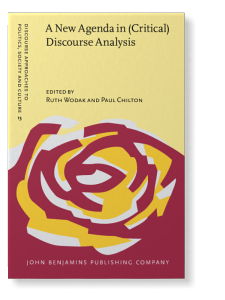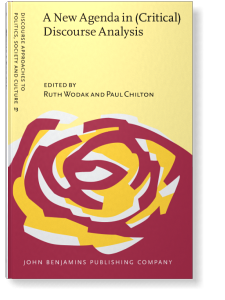A New Agenda in (Critical) Discourse Analysis
Theory, methodology and interdisciplinarity
Editors
Critical Discourse Analysis (CDA) has established itself over the past two decades as an area of academic activity in which scholars and students from many different disciplines are involved. It is a field that draws on social theory and aspects of linguistics in order to understand and challenge the discourses of our day. It is time for A New Agenda in the field. The present book is essential for anyone working broadly in the field of discourse analysis in the social sciences. The book includes often critical re-assessments of CDA's assumptions and methods, while proposing new route-maps for innovation. Practical analyses of major issues in discourse analysis are part of this agenda-setting volume.
[Discourse Approaches to Politics, Society and Culture, 13] 2005. xviii, 320 pp.
Publishing status: Available
© John Benjamins Publishing Company
Table of Contents
-
Acknowledgements | p. ix
-
PrefacePaul Chilton and Ruth Wodak | pp. xi–xii
-
PART I. Interdisciplinarity and (C)DA
-
Three models of interdisciplinarityTheo van Leeuwen | pp. 3–18
-
Missing links in mainstream CDA: Modules, blends and the critical instinctPaul Chilton | pp. 19–51
-
Critical discourse analysis in transdisciplinary researchNorman Fairclough | pp. 53–70
-
Contextual knowledge management in discourse production: A CDA perspectiveTeun A. van Dijk | pp. 71–100
-
Lighting the stove: Why habitus isn’t enough for Critical Discourse AnalysisRon Scollon | pp. 101–117
-
PART II. Implementing interdisciplinarity
-
Analyzing European Union discourses: Theories and applicationsRuth Wodak and Gilbert Weiss | pp. 121–135
-
‘European identity wanted!’: On discursive and communicative dimensions of the European ConventionMichał Krzyżanowski | pp. 137–163
-
Deliberation or ‘mainstreaming’? Empirically researching the European ConventionFlorian Oberhuber | pp. 165–187
-
“It is not sufficient to have a moral basis, it has to be democratic too.”: Constructing “Europe” in Swedish reports on the Austrian political situation in 2000Christoph Bärenreuter | pp. 189–211
-
Language, psychotherapy and client change: An interdisciplinary perspectivePeter Muntigl and Adam Horvath | pp. 213–239
-
PART III. Inside and Outside traditional disciplines
-
Anthropology of institutions and discourse analysis: Looking into interdisciplinarityIrène Bellier | pp. 243–267
-
The role of a political identity code in defining the boundaries of public and private.: The example of latent antisemitismAndrás Kovács | pp. 269–281
-
Social order and disorder: Institutions, policy paradigms and discourses: An interdisciplinary approachTom R. Burns and Marcus Carson | pp. 283–309
-
Biographical Notes | pp. 311–314
-
Name index | pp. 317–318
-
Subject index | pp. 319–321
“The present book is essential for anyone working broadly in the field of discourse analysis in the social sciences. The book includes often critical re-assessments of CDA's assumptions and methods, while proposing new route-maps for innovation.”
Folia Linguistica, Vol. 39:3/4 (2005)
“A precious resource for students and scholars interested in (critical) discourse analysis. This thought-provoking book is a must for anyone interested in discourse studies.”
Aleksander Carapic, Department of General Linguistics, University of Belgrade, Serbia
“Individually, the chapters of this collection present firmly grounded conceptual and operational perspectives about CDA. Its innovative approach is some of its great assets. It is a welcome addition to the growing base of literature devoted to the field of social sciences, and CDA in particular.”
Li Songqing, in SKASE, Journal of Theoretical Linguistics Vol. 3:1 (2006)
Cited by (109)
Cited by 109 other publications
Adams, Emmanuel Jibb & Baba Dorcas
Bouchafra, Salma
Brown, Andrew Ivan
Higgins, Michael & Angela Smith
Afzaal, Muhammad
Alshahrani, Abdulaziz
2023. Discourse analysis of male and female representatives of selected countries at the United Nations general
debates. AILA Review 36:2 ► pp. 163 ff. 
El-Falaky, May S.
Selvarajah, Senthan & Lorenzo Fiorito
Streltsova, O. I.
Streltsova, O. I.
Wang, Huabin
Zhang, Zhirong
Clarke, Elliot
Heikkinen, Suvi & Marke Kivijärvi
Jenks, Christopher
Kremer, Dominik & Tilo Felgenhauer
Pavlichenko, L. & O. Popivniak
Pavlichenko, Larysa V.
Sanjakdar, Fida
Afzal, Hanan, Masroor Sibtain, Zafar Iqbal & Hina Saleem
El Shazly, Reham Farouk
González, Yoan Karell Acosta
Li, Jian & Xue Eryong
Li, Tao & Kaibao Hu
López Maestre, María D.
2021. Blurred lines. Revista Española de Lingüística Aplicada/Spanish Journal of Applied Linguistics 34:1 ► pp. 144 ff. 
Roccia, Mariana & Jessica Iubini-Hampton
Souleymanov, Rusty, David J. Brennan, Carmen H. Logie, Dan Allman, Shelley L. Craig & Perry N. Halkitis
Valli, Chiara & Feras Hammami
Bolívar, Adriana
Catalano, Theresa & Linda R. Waugh
Catalano, Theresa & Linda R. Waugh
Chivaura, Runyararo Sihle
Cozzolino, Adriano
Huang, Mimi
2020. Introduction. In The Language of Crisis [Discourse Approaches to Politics, Society and Culture, 87], ► pp. 1 ff. 
Jenks, Christopher J.
Kutter, Amelie
Lahusen, Christian & Johannes Kiess
Reyes, Augustina
Tazanfal Tehseem, Sarwat Jabeen & Samia Naz
Boukala, Salomi
Boukala, Salomi
Boyd, Michael S.
2019. Chapter 12. Preaching from a distant pulpit. In Migration and Media [Discourse Approaches to Politics, Society and Culture, 81], ► pp. 291 ff. 
Lippert, Florian
Lukin, Annabelle
Nazariadli, Shahab, Duarte B. Morais, Kyle Bunds, Perver Baran & Stacy Supak
Siltaoja, Marjo, Katariina Juusola & Marke Kivijärvi
Sánchez Ruiz, Raquel
2019. Analyzing and comparing de Blasio’s and Quinn’s speech in their
democratic election programs for 2013 New York Mayoral Elections. Revista Española de Lingüística Aplicada/Spanish Journal of Applied Linguistics 32:1 ► pp. 304 ff. 
De Matteis, Lorena M. A.
Okulska, Urszula
Okulska, Urszula
2022. Discourse approaches to the study of dialogue and culture(s). Language and Dialogue 12:2 ► pp. 169 ff. 
Watson, Danielle, Francis D. Boateng, Nathan Pino & Paula Morgan
Molek-Kozakowska, Katarzyna & Jan Chovanec
2017. Media representations of the “other” Europeans. In Representing the Other in European Media Discourses [Discourse Approaches to Politics, Society and Culture, 74], ► pp. 1 ff. 
Pujante, David
2017. Chapter 3. The discursive construction of reality in the context of rhetoric. In Developing New Identities in Social Conflicts [Discourse Approaches to Politics, Society and Culture, 71], ► pp. 42 ff. 
Ryazanova-Clarke, Lara
SOLODOVNIKOVA, T.
Bartley, Leanne Victoria
Xu, Janice Hua
Xu, Janice Hua
Angouri, Jo
Cap, Piotr
O'Regan, John P. & Anne Betzel
Pühringer, Stephan & Katrin Hirte
Serrano-Velarde, Kathia
Smirnova, Anastasia
Temmerman, Martina & Maaike Van de Voorde
Van Dijk, Teun A.
Eder, Franz X. & Oliver Kühschelm
Ghachem, Inès
Filardo-Llamas, Laura
Kratochvíl, Petr & Lukáš Tichý
Molek-Kozakowska, Katarzyna
Parker, Ian
Shenk, Elaine M.
2013. H.R. 2499 Puerto Rico Democracy Act of 2010. Journal of Language and Politics 12:4 ► pp. 583 ff. 
Dunmire, Patricia L.
Musolff, Andreas
Musolff, Andreas
Schäffner, Christina
2012. Unknown agents in translated political discourse. Target. International Journal of Translation Studies 24:1 ► pp. 103 ff. 
Shi-xu
Teti, Andrea
Bell, Allan
Holland, Martin & Natalia Chaban
Martínez Guillem, Susana
Pavlidou, Theodossia-Soula
Felgenhauer, Tilo
Gavriely-Nuri, Dalia
2010. If both opponents “extend hands in peace” — Why don’t they meet?. Journal of Language and Politics 9:3 ► pp. 449 ff. 
Gergen, Kenneth J. & Mary M. Gergen
Horsbøl, Anders
Howarth, David
Lewis, J. P.
Löbel, Katarina
Fløttum, Kjersti & Dag Stenvoll
2009. Blair speeches in a polyphonic perspective. Journal of Language and Politics 8:2 ► pp. 269 ff. 
Grue, Jan
Grue, Jan
Janning, Frank, Philip Leifeld, Thomas Malang & Volker Schneider
Eriksson, Madeleine
Barbe, Katharina
Barbe, Katharina
Vincent Marrelli, Jocelyne
Wodak, Ruth
2005. Inter/trans/post-disciplinarity and the study of language and/in politics. Journal of Language and Politics 4:2 ► pp. 169 ff. 
Wodak, Ruth
2014. 2007. ‘Pragmatics and Critical Discourse Analysis. A cross-disciplinary Analysis.’ Pragmatics and Cognition, 15 (1): 203–225, selected 203–207, 215–218. In The Discourse Studies Reader, ► pp. 401 ff. 
[no author supplied]
This list is based on CrossRef data as of 18 july 2024. Please note that it may not be complete. Sources presented here have been supplied by the respective publishers. Any errors therein should be reported to them.
Subjects
Communication Studies
Main BIC Subject
CF: Linguistics
Main BISAC Subject
LAN009000: LANGUAGE ARTS & DISCIPLINES / Linguistics / General

